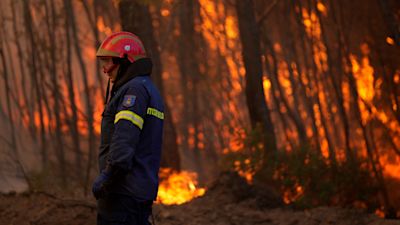World facing climate catastrophe and 'falling short' of targets, says UN report

The world was given a stark warning on Tuesday, as ITV News International Affairs Editor Rageh Omaar reports
International efforts to tackle climate change currently "fall far short" of what is needed to stop a temperature rise that could have catastrophic consequences, a UN report has said.
The United Nations Environment Programme (UNEP) released its Emissions Gap report on Tuesday, ahead of the COP26 climate summit which begins in Glasgow on Sunday.
It concluded that climate change measures taken by individual countries - as well as other international climate agreements - will not be enough to prevent a 2.7°C temperature rise this century.
Scientists have said it is vital we limit a global temperature rise to prevent the most catastrophic impacts of climate change, such as people losing their homes due to sea level rises, and droughts.
Inger Andersen, director of UNEP, said: “Climate change is no longer a future problem. It is a now problem".
Mr Andersen said we have eight years to almost halve greenhouse gas emissions if we want to to stand a chance of limiting the most catastrophic effects of global warming, warning: "The clock is ticking loudly.”
The COP27 climate conference - what you need to know
What is COP27? When and where will it be?
What is COP27? When and where will it be?
Each year, the United Nations Framework Convention on Climate Change (UNFCCC) meets at what is called the Conference of the Parties (abbreviated as COP) to discuss the world's progress on climate change and how to tackle it.
COP27 is the 27th United Nations Climate Change Conference of the Parties summit which will be held in Sharm El Sheikh, Egypt from November 6-18.
Who is going?
Who is going?
Leaders of the 197 countries that signed the United Nations Framework Convention on Climate Change (UNFCCC) - a treaty that came into force in 1994 - are invited to the summit.
These are some of the world leaders that will be attending COP27:
UK Prime Minister Rishi Sunak is attending the conference, after initially saying he wouldn't as he was too busy focusing on the economy within his first weeks in office.
US President Joe Biden and his experienced climate envoy, John Kerry, will appear at the talks.
France President Emmanuel Macron will also be among the heads of state from around the world staying in Egypt.
King Charles III will not be attending COP27, despite being a staunch advocate for the environment. The decision was made jointly by Buckingham Palace and former prime minister Liz Truss.
Elsewhere, Russian President Vladimir Putin and his Chinese counterpart Xi Jinping will not attend the talks just as they decided to do for COP26.
What is it hoping to achieve?
What is it hoping to achieve?
1. Ensure full implementation of the Paris Agreement and putting negotiations into concrete actions - included within this is the target of limiting global warming to well below 2C.
2. Cementing progress on the critical workstreams of mitigation, adaptation, finance and loss and damage, while stepping up finance notably to tackle the impacts of climate change.
3. Enhancing the delivery of the principles of transparency and accountability throughout the UN Climate Change process.
According to the report, countries pledging net zero carbon emissions could make big differences. However, it called current net zero plans "vague" and encouraged nations to back-up these pledges in law.
The report also found that most countries missed the opportunity to build back greener after the Covid-19 pandemic.
Global carbon and non-carbon emissions are expected to rise to a level only just lower than the record highs of 2019, the report said. This is despite a 5.4% drop in CO2 emissions in 2020, due to the pandemic.
In response to the report, Myles Allen, a professor of Geosystem Science at the University of Oxford, said there is "no appetite" around the world to reduce fossil fuel consumption to levels that would allow us to meet global climate commitments. “Insanity is keeping doing the same thing in the hope of getting a different outcome. On current progress, we’ll close the 2030 Emissions Gap sometime in the 2080s," Prof Allen said.
The report sets the tone for the COP summit in Glasgow - what does this mean for world leaders?
He added that the world needs to dispose of more carbon dioxide safely and underground, instead of "fly-tipping" CO2 into the atmosphere.
"We currently dispose of less than 0.1% of the carbon dioxide we generate: this needs to be at 10% by 2030 to be on track for 100% by 2050", he said.
"This is the gap that matters, and they won’t even be talking about it in Glasgow."